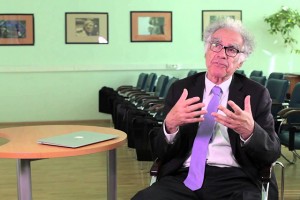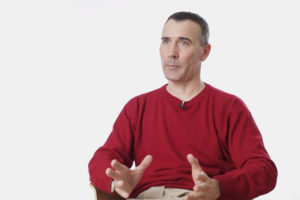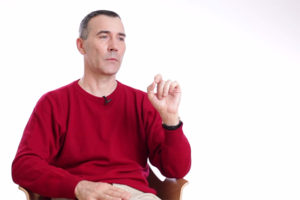Microhistory
Historian Carlo Ginzburg on the value of an individual, geopolitical traditions in history and globalization
So what did daily life look like for the medieval students, and who were these students? It’s another good question. Well, actually the study age is much younger, usually around 14 or 15 years old these students will be when they arrive in somewhere like Paris. Actually, in Bologna, it’s much older; the average age is more like in your 30s, so that’s an interesting fact. How many students? Anywhere between 500 and 1500 students were in Bologna by the 13th century, for example, so it’s fairly crowded, that would be fairly crowded, I think, in a small town today it’s fairly crowded.
So these students, in a way, take over these cities, and that’s actually the beginning of a lot of conflict. This is this kind of town-gown, infighting rivalry. These town-gown problems are there right from the start: there’s a lot of controversy because, as you can imagine, a thousand young people descending on a town which is maybe not quite prepared fully for it does create these issues.
So your average study day will probably start at something like 5 am: you might be getting up with a candle, it’s very early.
That’s because ordinary lectures begin very early in the day, and these are called ordinary, but really, they’re special lectures. These are the ones that count, these are the top professors, the top masters lecturing on the most important texts. Later on in the day, you have the extraordinary lectures, which despite their name, are actually the sort of more cursory, the more peripheral lectures, and these might be on texts that are important but not that important, not central to your study. These extraordinary lectures might also be by masters who are training still, maybe young scholars, maybe even bachelor students who just want to try out kind of teacher training. There will also be more intense study sessions. There will be informal discussions, as you imagine; the learning moves from the kind of formal setting to the more informal: they will be learning in pubs, bars, and taverns and things like that as well.
The arts are designed really to get you to learn how to speak, communicate and think in Latin, in the Latin language. A lot of this is elementary Latin learning: this will be your kind of grammar, how the Latin language works and this is so important because it means that every student, whether they’re studying theology or medicine or law, can speak in a common language, Latin, and they can communicate with some common foundational principles. So in logic, for example, you read the text of Aristotle and you learn how to make an argument, how to tear an argument apart, how to use a syllogism, and how to think clearly as Aristotle laid it out in ancient Greece. Rhetoric, too, and how to communicate those ideas in an effective way – that was an important part of this education, too. The sciences: you might wonder why music and astronomy are part of the sciences. We’re really looking for these foundational principles of harmony in the universe, and a lot of these texts will be very old indeed. There’ll be Boethius, a 5th-century text of music; there will be Euclid, even for geometry and so on. This will be the foundation of your study.
You will then move on to your more advanced studies. So if you’re in Paris and you’re studying theology, what you need to do next really is find yourself access to a copy of the Glossa Ordinaria. This is a wonderful text, this is the first kind of major textbook that exists in the university tradition. This is a grand compendium which was made around the year 1100, a grand compendium of all of the commentaries and thoughts about Scripture and by all the church fathers and the authorities like Augustine, Gregory the Great, and Saint Jerome, what have people said before about the great mysteries of the faith. When Jesus says ‘Sell all you own if you want to follow me’, well, what does this mean? What did the church fathers mean? You’re a young, 15-year-old or maybe by this age 17-year-old student, tackling these texts; you’re not doing it alone; you’re sitting there at 5 a.m. with your candle and you’re reading what all of the great minds before you have thought about these great mysteries.
Would you own a copy of the Glossa Ordinaria? It’s very unlikely. More likely, you will pass a copy around, or you may visit a copy.
These books take an enormous amount of time to produce. It does speed up with the development of universities, you do get kind of professional bookmakers doing it as fast as they can. Still, we’re talking about writing out by hand, scratching onto animal skin the text of Scripture and the commentaries: you can imagine what that’s like.
Now, everything I said is very expensive, and it is not cheap to go to any of these universities. I mean, firstly you have to travel there, you’re travelling from, say, Scotland or Spain, you want to get to Paris, that’s expensive on its own. Couldn’t happen without a money economy, by the way. You can’t turn up with a flock of sheep and say: look, I’m going to pay with this. No, you have to have money to do it.
How do the students get the money? Of course, they’ll give small amounts of money to their masters too, and they have to pay for their board, they’re lodging: where are you going to live? People will quickly make rooms available; student housing will be built rather quickly. Some people just say: well, you can sleep in our shed or in our barn, or you can have this room. It’s very ad hoc. What happens? How do you pay for all of this? Some students are wealthy anyway, there are aristocrats in Paris, and we hear some of this in the story of Rupert of Deutz who’s a young student who had been a monk who went to Paris to get a kind of a more formal education. He describes how all of his wealthy friends looked down on him because he was poor and he couldn’t afford good clothes, he can’t afford books and so on. Of course, it’s a very self-serving story that he tells us how great he was despite his setback.
Student culture probably hasn’t changed so much over the years and drinking is part of student culture in the Middle Ages. You may know that there’s a higher alcohol consumption generally in medieval life than there is today. There have been some calculations that the average person is drinking something like three or four pints of beer a day from childhood up. Water is available but sometimes you don’t trust the water as much as you trust the beer. So, there is a drinking culture in Paris or Bologna from the very beginning. This does cause trouble, this causes fights, this causes rivalries to sort of intensify three pints in, and it’s amazing in a way that all of this study is getting done. It does take longer: maybe it’s because of the drink but your average degree might be more like seven years than three years, especially if you’re going to take your studies really seriously and if you’re going to go on to be a master of theology, it might be more like 10 or 12 years which is even longer than an American graduate trajectory today.

Historian Carlo Ginzburg on the value of an individual, geopolitical traditions in history and globalization

Historian Richard Bourke on the components of nationalism, national identity, and the role of ideology and the...

Historian Richard Bourke on the French Revolution, Marxism-Leninism, and the defense of liberty